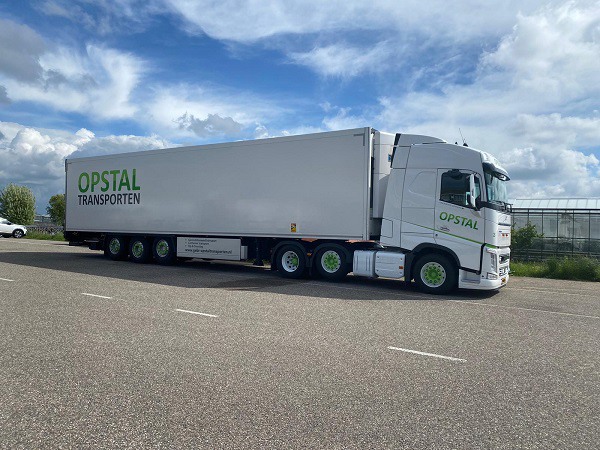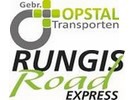"Transportation will always remain, but it's going to change," says John Opstal. He's one of three brothers that founded Gebr. Opstal Transporten in the Netherlands in 2016. "You have to continuously ask yourself, even as a small company - what can we do?" These young entrepreneurs are continually looking to the future. They say if you always do everything the same way, nothing will change. "And something really needs to happen."

John, Barry and Stef Opstal
Sustainability is at the forefront of this. "Sustainability is a broad term for us. It includes not only the environment but also how we treat our staff. We're a family business and consider our employees family." That's reflected in things like how the transport company views the shortage of international drivers. This has plagued the transport industry for several years. It's now hampering Gebr. Opstal Transporten's growth.
They sometimes have to turn down a transport request. "You can expand, but to do so, you have to have drivers," John says. He points out that working hours, especially weekends and long trips are the biggest deterrent in the search for new drivers. "Working seven days a week was the norm. Not so anymore. As a company, you have to adapt; otherwise, it becomes difficult to find drivers."
Enjoying work
"Talking to clients can provide solutions. If they understand why so many drivers are dropping out, there are possibilities. Often it only requires a small adjustment on our and the client's part. It's doable." Weekend trips aren't popular with drivers. These have departures on Friday for deliveries on Saturday. They then return on Sunday. "Let's look at those Saturday deliveries. Sometimes, depending on Saturday sales, you can leave on Thursday for a Friday delivery."
"Or leave on Sunday for delivery early on Monday morning. Thus avoiding weekend trips. You can only achieve these kinds of solutions by communicating with each other." Opstal says finding international drivers where they're located in the Netherlands is a widespread problem. "We all experience it. And the question is: how long do you keep saying, work is work. Without looking for a solution? It's important to us that our employees enjoy their jobs," he explains.
More intricate network
There's another development in the transport world. John thinks this will contribute to changing drivers' schedules. The wholesale market will stay important. But he foresees a partial shift to a more intricate distribution network. "We still focus on the wholesale market. And it always will be there. However, at the same time, people are placing increasing value on deliveries closer to home."

"If a Parisian greengrocer can order his goods telephonically, he wants them delivered to his doorstep. Transporters will increasingly go directly into the inner cities of Paris and Brussels, to businesses," he continues. "That will shorten the lines. We can also make broader use of our equipment. We're going to speed up transit times." Working with partners for transport to the inner city creates shorter transport lines. They also ensure working hours that allow drivers more time at home.
"We want to oversee the work in a way that matches the drivers' wishes." Gebr. Opstal Transporten expects half its export lines will run in this faster, more direct way. They're also working on reducing their CO2 emissions. John says they can't use alternative fuels like hydrogen, LPG, or electricity. That's because of the distances driven and the need to use triple-axle trucks. For refrigeration, however, there are opportunities for CO2 reduction. "Soon, we'll be partially using HVO (renewable diesel) for cooling. That'll cut emissions by 80 to 90%," John concludes.
Voor meer informatie:
John Opstal Gebr. Opstal Transporten
Gebr. Opstal Transporten
Klappolder 121
2665 LP Bleiswijk
T: +31 (0)10 333 0228 of +31 (0)6 14 68 05 22
E: john@gebr-opstaltransporten.n l
www.gebr-opstaltransporten.nl
